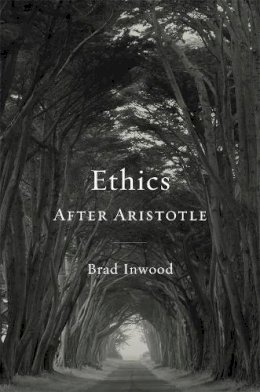18%OFF

Stock image for illustration purposes only - book cover, edition or condition may vary.
Ethics After Aristotle
Brad Inwood
€ 53.99
€ 44.51
FREE Delivery in Ireland
Description for Ethics After Aristotle
Hardback. The earliest philosophers thought deeply about ethical questions, but Aristotle founded ethics as a well-defined discipline. Brad Inwood focuses on the reception of Aristotelian ethical thought in the Hellenistic and Roman worlds and explores the thinker's influence on the philosophers who followed in his footsteps from 300 BCE to 200 CE. Series: Carl Newell Jackson Lectures. Num Pages: 160 pages. BIC Classification: HPCA; HPQ. Category: (G) General (US: Trade). Dimension: 218 x 147 x 17. Weight in Grams: 354.
From the earliest times, philosophers and others have thought deeply about ethical questions. But it was Aristotle who founded ethics as a discipline with clear principles and well-defined boundaries. Ethics After Aristotle focuses on the reception of Aristotelian ethical thought in the Hellenistic and Roman worlds, underscoring the thinker’s enduring influence on the philosophers who followed in his footsteps from 300 BCE to 200 CE.
Beginning with Aristotle’s student and collaborator Theophrastus, Brad Inwood traces the development of Aristotelian ethics up to the third-century Athenian philosopher Alexander of Aphrodisias. He shows that there was no monolithic tradition in the ... Read more
Product Details
Publisher
Harvard University Press
Format
Hardback
Publication date
2014
Series
Carl Newell Jackson Lectures
Condition
New
Weight
354g
Number of Pages
176
Place of Publication
Cambridge, Mass, United States
ISBN
9780674731257
SKU
V9780674731257
Shipping Time
Usually ships in 7 to 11 working days
Ref
99-1
About Brad Inwood
Brad Inwood is Professor of Philosophy and Classics at Yale University.
Reviews for Ethics After Aristotle
Ethics After Aristotle is an important examination of the principal themes of philosophical ethics in the Peripatetic tradition from Theophrastus to Alexander. Inwood’s approach brings the collective significance of an often fragmentary—and, until recently, rather inaccessible—set of texts to the fore, both as an independent strand in Hellenistic philosophy deserving of study in its own right and as telling contributions ... Read more
